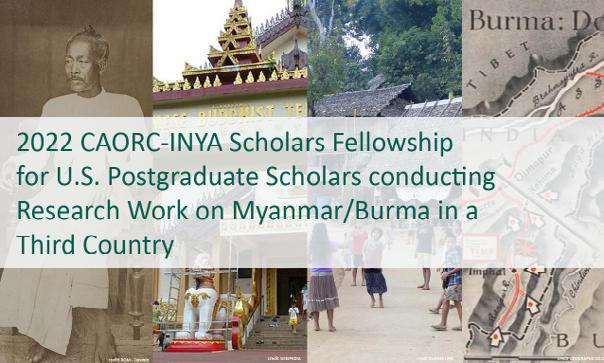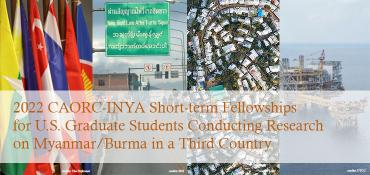
5 minute read
New Fellows at Inya
Dr. Jangai Jap is a Post-Doctoral Fellow at the University of Texas at Austin.
Her project, “Experiencing the state: street-level bureaucracy and ethnic politics in Myanmar” examines how citizens routinely encounter the state, via street-level bureaucracy. They may need to renew their government-issued ID, register their household, or obtain other official documents necessary for their everyday life. What are the political implications of these mundane encounters with the state? In what ways do they shape citizen-state relations? This project addresses these questions by examining citizens’ experiences with various forms of the state in Myanmar. It advances a theoretical argument that encounters with the state has a profound impact on minority-state relations but not on majority-state relations. This argument is evaluated with empirics from Myanmar. Her field research will take place in Thailand.
Advertisement
Dr. Billie Thoidingjam Guarino, an independent scholar who obtained her PhD degree from Jamia Millia Islamia (JMI) University, Delhi, describes her “Biopolitics and Precarity: The Refugee Crisis and Gendered Resistance in Myanmar” project as an examination of the multidimensional precarity that frames Burmese refugees’ lives due to restrictive asylum and migration regimes of Myanmar and its neighboring countries. The investigation will center on the biopolitical regime, the Tatmadaw’s strategy of ‘slow genocide’ through surveillance, biopower, and counter-protests initiatives leading to a spiraling refugee crisis. She will interrogate the inescapable ontological condition of displacement and vulnerability of bodies. A second trajectory of the project will examine dissent and gendered protest using bodies as artistic and political conduits. Performances of dissent/protest and artistic performances by 3AM (Yadanar, Ma-Ei, and Ko-Latt) will be her case studies. The research fieldwork for the project will be conducted in Imphal and Moreh in Manipur and Champhai and Cherhlun in Mizoram.
Dr. Matthew Bowser is an Assistant Professor of Asian History at Alabama A&M University. His project titled “Containing Decolonization: British Governance and the Politics of Race in Late Colonial Burma” examines the emergence of the newly independent state of Burma from British colonial rule, tracing the process of decolonization from the turbulent 1930s through World War II to independence in 1948. In the literature on the colonial Burma and the British Empire, there is a rupture between the seemingly unrelated processes of “divide-and-rule” undertaken during colonial rule and the post-colonial “containment” policies of the Cold War. He argues that these processes are one-and-the-same, and that British colonial officials actively attempted to “contain” the internationalist left while amplifying the ethnonationalist right during the process of decolonization in Burma. His field research will be conducted in the British Library, London UK and National Archives of the United Kingdom, Kew UK.
Dr. Andrea Malji is an Assistant Professor of International Studies at Hawaii Pacific University in Honolulu. Of her project titled “Climate and Community: The Challenges Facing Rohingya Refugees in Bangladesh”, she says: “Over one million Rohingya refugees currently live in Bangladesh. Over 80% of Rohingya refugees have entered Bangladesh since 2017 following forced displacement by government and militia forces in the Rakhine state of Myanmar. Most refugees currently reside in Cox’s Bazar and receive limited services and support. Refugees are subject to violence, poor living conditions, and marginalization within Bangladesh. Additionally, Cox’s Bazar is highly prone to climate disasters. This project will investigate the multiple challenges facing Rohingya refugees in Bangladesh and identify how Bangladesh and the international community are effectively addressing these needs and where they are falling short.” She will conduct her field research in Bangladesh.
Hasta Colman, a PhD student at Johns Hopkins University, describes her project titled “Karen and Karenni across the Thai-Myanmar border: identity and political aspirations in the post-coup context” as follows: “The purpose of this research project is to investigate the links between Karen and Karenni communities in Myanmar and Karen and Karenni communities in Thailand in their responses to the coup and the refugee crisis it triggered on the Thai-Burma border. By conducting fieldwork in Northern Thailand, including interviewing members of both communities, as well as members of the NUG and NUGCC, I will investigate the shifting meaning of these ethnic identities in the context of the Myanmar resistance movement’s new federalist aspirations. I will also investigate the impact of shared ethnic identities across national boundaries during times of crisis.” She plans to carry out her fieldwork in Bangkok, Chiangmai, Chiang Rai and border towns in Thailand.

Brendan Flanagan, a PhD student at the University of Hawaii at Manoa, titles his project: “Place and Displacement: Conservation from Below in a Time of Exile”. He seeks to investigate how a politics of place is articulated under the difficult conditions of uncertain exile. Working at the intersection of political ecology and phenomenology, the intention is to highlight how the experience of displacement and the constant memory of place shape and inform actions of Karen environmental activists from Myanmar, currently in Thailand, who seek to sustain acts of ecological care against the odds of enforced distance and looming state violence. Of central importance will be an investigation of the Thai/Myanmar border as a material and discursive presence in the lives of Karen exiles. His field research will be conducted in Mae Sot, Kanchanaburi, Sangkhlaburi, Chiang Mai, Mai Seriang, Phuket and Bangkok in Thailand.
Michael Dunford, a PhD student at the Australian National University, explores “Ta’ang Lifeworlds Across the Thai-Myanmar Border”. In doing so, he describes his research as follows: “How do the Ta’ang maintain community connections in the face of political conflict and intensive migration, and when are those connections lost or erased? Situating myself on the Thai-Myanmar border, I will answer this question by analyzing Ta’ang religious networks and ethno-political projects (e.g., the Ta’ang Culture and Literature Committee). This project is an attempt to connect the extensive research on Ta’ang communities in Thailand—where maybe ten percent of the global Ta’ang population in lives—with the goals and projects of the Ta’ang communities inside Myanmar, which play an integral role in the socio-politics of Shan State.” He will conduct field work in Chiang Mai and Chiang Rai Provinces in Thailand.


